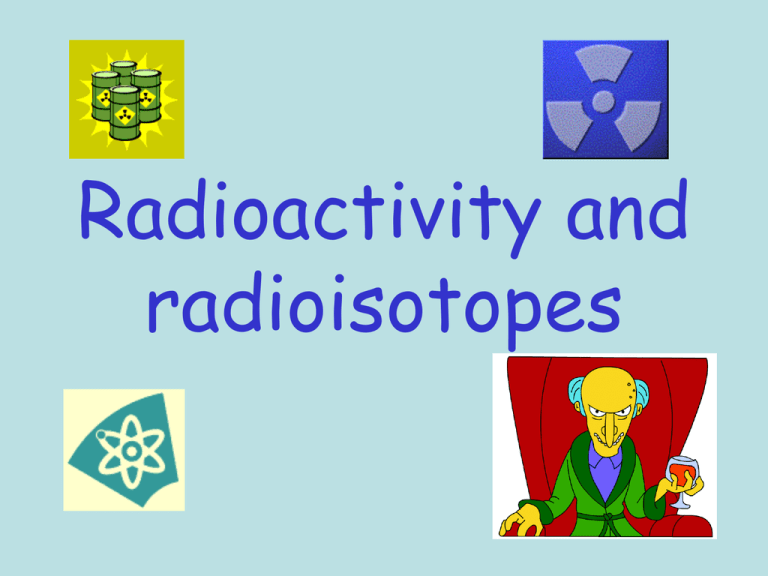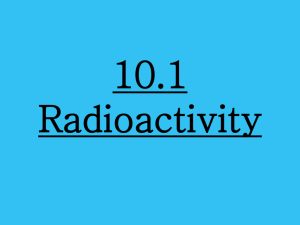Radioactivity and radioisotopes
advertisement

Radioactivity and radioisotopes A very brief history of the discovery of radioactivity Dear Marie, do you remember those uranium compounds that glow when I put them under sunlight? Well, guess what I found out last night as I put them in my drawer… in the same drawer I had a key on top of a film plate. When I developed the film the image of the key was impressed on it, although the film was wrapped! These compounds must emit invisible rays that penetrate certain materials. I think I’ll call them Radioactivity. Henri Bequerel (1852-1908) Don’t say more dear Professor! I have taken on the work you have passed on to me and I have already discovered two new elements more radioactive than uranium, polonium and radium. To isolate 1 g of radium I had to buy a tonne of pitchblende and separate the radium. The amazing thing is that the radium is about one million times more radioactive than uranium! Marie Curie (1867-1934) Hey guys, thank you for this stuff! Now that we know so much I can find out the nature of this radioactivity pal! In fact, I have already discovered that there are at least two kinds of radiation. I’ve called the first alpha. This gets easily absorbed and it’s positively charged. The second is beta, it is more penetrative and has negative charge. Ernest Rutherford (1871-1937) What is radioactivity? Radioactivity is the spontaneous emission of energy and particles due to the breaking down (disintegrating) of the nuclei of unstable atoms. Energy Particles What is radioactivity? It is not known what causes this spontaneous decay of the nucleus. However we know the nature of the radioactivity. It can manifest in three forms; alpha and beta particles and gamma radiation. Gamma rays Beta particles Alpha particles What is radioactivity? Suggest reasons why the rate of radioactive decay seems not to be affected by chemical reactions, temperature, or pressure. • Chemical reactions involve only electrons within atoms and energy of the order of a few eV. • Even at high temperatures of 6000 K (surface temperature of the Sun) the vibration energy of the atoms only about 1 eV. • But binding energies of nuclei are of the order of 10 MeV (10000000 eV). The three types of radiation Use this table to find information about and to compare a, b and g radiation Alpha (a) Nature Charge Mass Speed Ionizing effect Most dangerous Beta (b) Gamma (g) The three types of radiation Use this table to find information about and to compare a, b and g radiation Alpha (a) Nature Charge Mass Speed Ionizing effect Most dangerous Beta (b) Gamma (g) It’s a nucleus of It’s an electron 4 helium 2 He. Two eprotons and two neutrons It’s an electromagnetic wave The three types of radiation Use this table to find information about and to compare a, b and g radiation Alpha (a) Nature Charge Mass Speed Ionizing effect Most dangerous Beta (b) Gamma (g) It’s a nucleus of It’s an electron 4 helium 2 He. Two eprotons and two neutrons It’s an electromagnetic wave +2 -1 0 The three types of radiation Use this table to find information about and to compare a, b and g radiation Alpha (a) Nature Charge Mass Speed Ionizing effect Most dangerous Beta (b) Gamma (g) It’s a nucleus of It’s an electron 4 helium 2 He. Two eprotons and two neutrons It’s an electromagnetic wave +2 -1 0 Relatively large Very small No mass The three types of radiation Use this table to find information about and to compare a, b and g radiation Alpha (a) Nature Charge Mass Speed Ionizing effect Most dangerous Beta (b) Gamma (g) It’s a nucleus of It’s an electron 4 helium 2 He. Two eprotons and two neutrons It’s an electromagnetic wave +2 -1 0 Relatively large Very small No mass Slow Fast Speed of light The three types of radiation Use this table to find information about and to compare a, b and g radiation Alpha (a) Nature Charge Beta (b) Gamma (g) It’s a nucleus of It’s an electron 4 helium 2 He. Two eprotons and two neutrons It’s an electromagnetic wave +2 -1 0 Relatively large Very small No mass Speed Slow Fast Speed of light Ionizing effect Strong Weak Very weak Mass Most dangerous The three types of radiation Use this table to find information about and to compare a, b and g radiation Alpha (a) Nature Charge Beta (b) Gamma (g) It’s a nucleus of It’s an electron 4 helium 2 He. Two eprotons and two neutrons It’s an electromagnetic wave +2 -1 0 Relatively large Very small No mass Speed Slow Fast Speed of light Ionizing effect Strong Weak Very weak Mass Most dangerous When source is inside the body When source is When source is outside the body outside the body • Give two examples of each? • What type of materials can block(protect from) each type of radiation?

